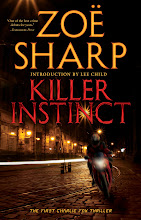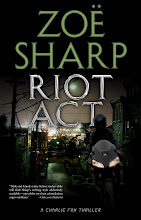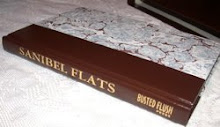Busted Flush Press's new reprint of
Ace Atkins's first novel featuring blues historian Nick Travers,
Crossroad Blues, also features an original, never-before-published Nick short story,
set at Christmas! As an early Christmas gift to fans, BFP is serializing the story in three posts... Here's the third & final part... Enjoy! (Read part one
here and part two
here.)
"LAST FAIR DEAL GONE DOWN"
An original Nick Travers story.
© Ace Atkins, 2009
(concluded)
SOMETIMES I LIKE to hear Dixieland Jazz after several drinks. Sometimes I like to hear my boots as they clunk across a hardwood floor. Sometimes I even like to cover the tall windows of my warehouse with bed sheets and watch old movies all day. But most of all, I like to sit in JoJo’s and listen to Loretta Jackson sing. Her voice can rattle the exposed brick walls and break a man’s heart.
It was Christmas Eve, a week after Jay picked up Blackie. I was nursing a beer and watching Loretta rehearse a few new numbers. Old blues Christmas songs that she always mixed in with her set during the season. Growling the words to “Merry Christmas, Baby” and making my neck hairs stand on end.
“You keep babyin’ that beer and it’s gonna fall in love with ya,” JoJo said, as he washed out a couple shot glasses in the sink.
“Everybody needs a friend.”
“Mmhmm.” He dried the inside of the glasses with a white towel and then hung it over his shoulder. “Why you down here today, anyway?”
“Sam’s been wanting to go Christmas shopping in the Quarter all week. And I promised.”
“You hear anymore from Medeaux ’bout that pimp?”
“Nah. Blackie’s still in jail far as I know.”
“You let me know if somethin’s different.”
Loretta finished the song with a great sigh into her microphone and a quick turnaround from the band. The guitar player made his instrument give a wolf whistle as Loretta stepped off stage. Running a forearm over her brow, she walked over and sat next to me.
“My boy Nicholas,” she said as she rubbed my back. “My boy.”
“Your boy Nicholas sittin’ on his ass drinking while his new woman trudging round these old French streets looking for gifts.”
“My boy deserves it.”
“Hmphh.”
“Y’all talkin’ ’bout Fats, weren’t cha?”
JoJo nodded and walked back into the kitchen.
“Man had a sad life, Nick. Cain’t believe he sold his sax for that girl.”
“Guess he loved her.”
“Hell, she was just a two-bit whore.”
“Loretta.”
“Naw, I’m serious. She was fuckin’ half the band.”
“What?"
“Sure she was. Saw her almost get her cheap ass beat by Fats’ drummer out back. Havin’ some kind of lover’s quarrel, I guess.”
“When was this?”
“Few days before he died.”
I took a deep breath, and my fist tightened on top of the bar.
***********************
TOM CAT WAS passed out on his sofa when I kicked in the door to his apartment. Little multi-colored Christmas lights had fallen on his body and face, and it gave him a festive, embalmed look. I grabbed him by a dirty Converse high top and yanked him off the sofa. His eyes sprung awake.
“Who killed him?”
“Nick, man. Merry Christmas to you, too. Hey, I—”
“Who killed him?”
“You trippin’, man.”
I yanked him to his knees and punched him hard in the stomach. He doubled over weakly.
“Why didn’t you tell me you were sleeping with her?”
“I wasn’t.”
“The pimp didn’t kill Sarah, did he? He had no reason. You did. You loved her.”
“Fuck you.”
I kicked him hard in the side with my boot. I didn’t enjoy it. It didn’t make me feel like a man. I just did it.
“It was a mistake. Fats shouldn’t been a part of it.”
“Part of what?”
He rolled to his side and wiped his tears with a ragged flannel shirt sleeve. Pushing his long greasy hair, he told me.
I did not interrupt.
***********************
IT WAS BLACKMAIL. Sarah and Tom Cat had worked out a scam on a local trial lawyer. But he wasn’t just any lawyer. He was Spencer Faircloth, lawyer to the New Orleans mob. An all-star backslapper among criminals.
Their plan included a sick little videotape. Maybe it included a burro. I don’t know what was on it, didn’t want to know, but I took it with me.
I let Tom Cat go, drove to a nearby K&B drugstore, and looked through a water-logged phone book. Some of the pages were so stuck together that the book felt like papier-mâché.
There was no listing. I called information and was told he had an unpublished number.
I called a two-hundred-and-fifty-pound bail bondsman I know named Tiny. He asked for the payphone’s number.
He called me back in five minutes with the address.
Faircloth lived in an ivy-covered brick mansion with a spiked iron fence and stained glass windows. When I pulled up near the address on St. Charles, dozens of finely dressed men and women were drinking in Faircloth’s hospitality.
I could see them all, like fish in an aquarium, through the tall windows.
I lit a cigarette, smoked it into a nub, and then decided to go in.
Most of the men I passed were in winter wool suits, accented with the occasional silly holiday tie. Candy canes, reindeer, and elves.
I was dressed in blue jeans, boots, and a jean jacket.
I wasn’t accepted.
“Sir?” a large black man asked me.
“
Si.”
“Can I have your invitation?”
“I’m here to see Mr. Faircloth.”
“Mr. Faircloth is spending time with his guests. Can I help you?”
The man’s hair was Jheri-curled, and he wore a finely trimmed mustache.
“Aren’t you Billy Dee Williams?”
He made a move toward me.
“Tell him that a friend of Sarah’s is here.”
He looked down at me, and then left.
I walked over to the buffet line and ate three very tiny turkey sandwiches. I didn’t see any tiny quiches.
A few minutes later, a young man in his twenties walked over to me. I didn’t recognize him at first. His hair seemed slicker tonight. His movements were more polished.
“Can I help you?”
“Are you Spencer Faircloth?”
“No.”
“Then you can’t. I’ll just stay here, continue to eat, and thumb my nose at the conventions of the rich.”
“I’ll have you removed.”
“You do and I’ll propose a toast to Sarah. The finest whore that Faircloth ever had killed.”
“You’re insane.”
“Perhaps.”
Then I remembered him, the younger man from the hotel where I first met Sarah. The one who’d backed up the older man. I looked for him.
I saw the gray-headed gent laughing it up with a group of his ilk near the French doors.
I jumped upon the top of the linen buffet table, my dirty buckskin boots soiling the whiteness. I grabbed a glass and spoon and clinked the two together loudly.
“I would like to propose a toast to the host with the most.
Spence Faircloth.”
The party hesitatingly clapped. A drunk elderly man hooted his approval.
“Thank you, grandpa,” I announced to the old man. “But right now, I would like to offer Mr. Faircloth a deal.”
They were silent.
The two men were whispering to Faircloth, who had his arms tightly wrapped around himself.
“You might call it the last fair deal gone down, like my old friend Fats used to say. The deal, Mr. Faircloth, is that you join me on this table and announce to the party that you are a gutless turd who had a friend of mine killed.”
The crowd stayed silent. A wrinkled old woman with huge breasts shook her head and blew breath out her nose.
“But where is the deal, you ask?” I said, reaching deep into the inner layer of my denim jacket and pulling out the videotape.
I held it high over my head like a Bourbon Street preacher does a Bible. I mimed my hands to pretend I was weighing the two.
Billy Dee Williams was trying to approach me from behind.
“What’ll it be, Spence?”
Faircloth shook his head, turned on his heel like a spoiled child, and walked away.
I put the videotape back in my jacket and hopped off the table.
Just like any other unwanted guest, no one tried to stop me as I left. I think they were waiting for me to pull a red bandana up over my nose and ask for their jewels.
I got in my Jeep and headed back to the Warehouse District, my hands shaking on the wheel.
***********************
I RETURNED TO my warehouse only long enough to grab a fresh set of clothes, binoculars, a six-pack of Abita beer, a frozen quart of Loretta’s jambalaya, my Browning, and Sam’s Christmas present—a 1930s Art Deco watch that I bought on Royal Street a few weeks ago.
It was so silent in my darkened space that I could hear the watch’s soft ticks as late-day orange light retreated through the industrial windows.
I tucked everything in a tattered army duffle bag and put it outside my door.
I used only the small lock near the doorknob, leaving the deadbolt open.
Walking across Julia Street, I felt a cold December wind coming from the Mississippi. It smelled stagnant and stale. I could almost taste its polluted, muddy water.
In the warehouse opposite mine, Sam slid back the door with a scowl on her face. Her short blonde hair was tousled, and she was wearing an old gray Tulane sweatshirt of mine that hung below her knees.
“You’re scowling.”
“You left me wandering around the Quarter. What the hell is the matter with you?”
“I’m sorry.”
She let me in and I followed her to the second floor of her warehouse that looked down on a dance studio. The lights were dimmed on the floor below, and a stereo softly played Otis Redding.
“I’m still mad.”
“I know.”
She reheated the jambalaya in a black skillet, and we shared the six-pack of Abita. I told her about Tom Cat and about Spencer Faircloth’s dinner party. She shook her head and tried not to laugh. When I told her I had my gun, she didn’t like that at all, and walked out of the kitchen. One of her cats trailed her.
But she warmed up after a few more of Otis’ ballads and a few more Abitas.
Later, we made love in her antique iron bed, Christmas lights strung over her headboard. The beer, food, and music blended into a fine holiday mood.
The next day, we opened our gifts. She gave me an old Earl King record I’d wanted for years, a gunmetal cigarette lighter, a first edition of
Franny and Zooey, and a framed picture of Tom Mix.
She loved the watch.
We returned to bed a few more times that day, only leaving the mattress for the kitchen and something to eat. It was one of the best Christmases I can remember.
***********************
THEY CAME AROUND midnight, Sam still cradled in my arms asleep. Two cats were curled in balls at the foot of the bed. I could hear the sound of the engine and two doors closing while I carefully unentwined myself from Sam and peeked through her blinds. The car, a black sedan, was still running. Two men were at my front door with a crowbar.
I walked into the kitchen, pulled on my jeans, boots, and the Tulane sweatshirt. I inserted a clip into the Browning and pulled a black watch cap over my ears.
Before clanking down the steps to the street level, I called 911, reported a burglary and shooting at my address, and hung up.
Outside, it was cold enough to see my breath.
I could see someone seated in the back of the sedan smoking a cigarette. A tiny prick of orange light and then a smoky exhaling that clouded the windows. Without stopping, I bent at the waist and jogged behind the car. I opened the back door and climbed inside.
I was seated right next to Spencer Faircloth.
I’ll never understand why he came. He was far too smart to put himself anywhere near something as dirty as this. I’m pretty sure it was just ego. The gutless turd remark must have gotten to him.
I poked him in the ribs with my Browning.
“Spencer, you old dog.”
I reached over the driver’s seat and pulled the keys from the ignition while I kept the gun pointed at him. I then motioned him outside, found the key for the trunk, and pushed him in with the flat of my palm.
My face felt cold and wind-bitten when I smiled.
They had made a real mess of my turn-of-the-century door, which had scrolled patterns around the mail slot. Splintered wood and muddy boot tracks led up my side staircase.
This time I did not run. I crept.
But I had the advantage. I knew every weakness in that staircase. Each creak. Every loose board.
I heard crashes and thuds. They were throwing my shit all around. And they must have enjoyed making a mess because they were laughing the whole time.
At the top of the landing, I straightened my right arm and fired a slug into the shoulder of the black man with curly, greasy hair. As he spun, one of my old books flew out of his hands, pages fluttering like a wounded bird before it crashed to the floor.
The young preppy white guy I’d encountered twice wasn’t ready either. It took him a full four seconds before he tried to reach inside his raincoat. His eyes were wide with fear when I fired, hitting him in the thigh.
His gun slid along the floor, several feet away from him.
He was no bodyguard or the trigger man. He was just the guy fetching laundry and coffee for Faircloth.
But ole Billy Dee was the real deal.
I walked over to him, slowly. My boots clanking hard in my warehouse, the place where I slept, ate, and read.
The book he’d been tearing pages from was Robert Palmer’s
Deep Blues. The dog-eared pages littered the floor around him, some misted with blood from the bullet’s impact.
He had his gun still in hand. A revolver.
“You’re not a blues fan, are you?”
He looked up at me and laughed.
“You remember that old man who you shot in the head?”
“Should have been you, motherfucker.”
“That old man could play ‘Blue Monday’ and break your heart.”
“You’re crazy.”
“Maybe.”
With my gun pressed flat against his nose, I took his revolver.
“I’ll find you,” he said. “I promise you that.”
The police arrived a short time later, and with the coaxed testimony of Tom Cat, all three were charged with murder.
***********************
ON NEW YEAR’S Eve, I played “Auld Lang Syne” on Fats’ tarnished sax while Loretta sang. Everyone made toasts and kissed while I placed the battered instrument in a dusty glass case where it still remains today.
Sam came over, put an arm around my neck, and kissed me hard. I stood back and looked at Fats’ picture on top of the wooden case.
She kissed me again, and I turned away.
JoJo told me I did a “real nice job” playing harp that night and handed me another Dixie. Drunk, JoJo ambled up on stage and professed his love for his wife. She watched him and smiled, then gave him a kiss, too.
I wish I could’ve kept the moment, everything the way it was right then. But that was the year I met Cracker and went looking for the lost recordings of Robert Johnson in the Mississippi Delta. And my life was never the same.
******************************
We hope everyone has a wonderful New Year! Please take a moment to Ace Atkins's blog & website.  This feels like a dream... We've just learned that BFP has earned two Macavity Award nominations!
This feels like a dream... We've just learned that BFP has earned two Macavity Award nominations!



















































.jpg)

